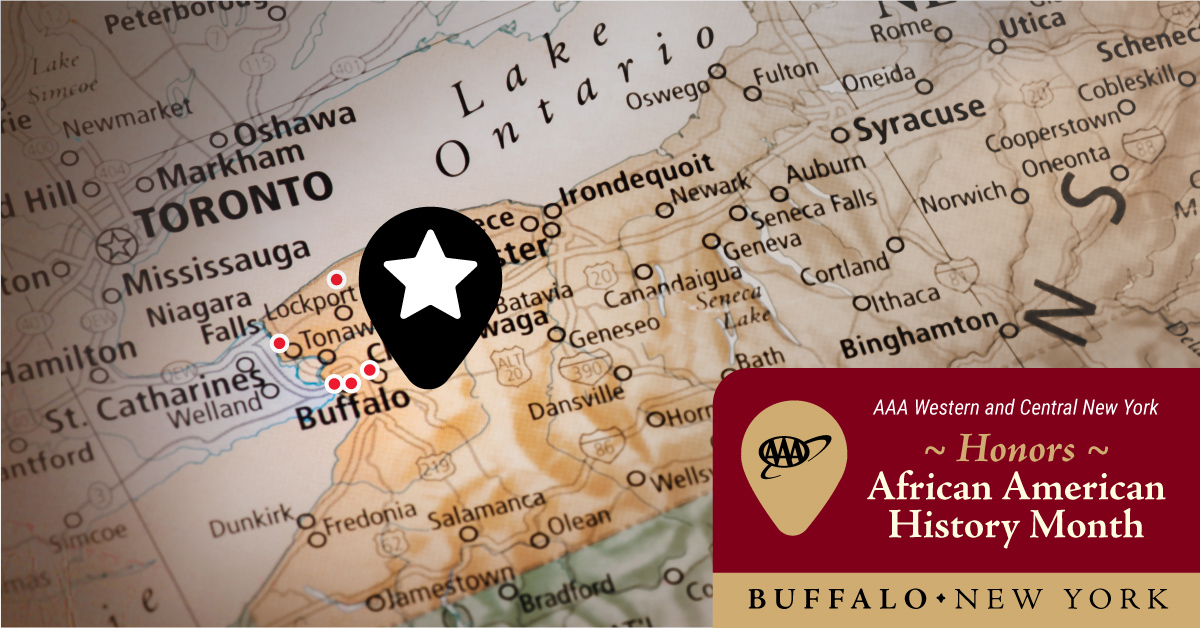AAA Honors African American History in Buffalo Area
AAA Honors African American History in Buffalo Area

Looking to explore and learn more about African American history in Western New York? Start your cultural tour right in downtown Buffalo where many historic sites are open to the public.
AAA recommends visiting the Colored Musicians Club and the Michigan Street Baptist Church. By then you’ll work up an appetite, so consider swinging by the famous Broadway Market to enjoy some soul food cooked up by Margie.
Then head to Niagara County where you’ll get an up-close look at the sites where fugitive slaves from the Southern U.S. crossed the Niagara River to find freedom. The journey ends at Murphy Orchards, once a secret stop on the Underground Railroad.
- Colored Musicians Club 145 Broadway, Buffalo, NY
The Colored Musicians Club has been music to the ears of African American musicians since 1918. The club moved to its current location in 1934, which now features a museum where visitors can immerse themselves in the area’s musical history. What started as a hangout for musicians, the Club became a haven where jazz greats could show off, but most importantly it brought all races together. It was designated a historical preservation site in 1999 and is now the only remaining African American club of its kind in the United States. - Michigan Street Baptist Church 511 Michigan Ave., Buffalo, NY
Dating back to 1845, The Michigan Street Baptist Church is synonymous with the Underground Railroad – it was often the last stop for fugitive slaves before their freedom crossing into Canada. The church touts that it was built by African Americans for African Americans serving as a meeting place for anti-slavery and reform movements. Famous educators and abolitionists spoke at the church including Booker T. Washington and Frederick Douglass. That proud heritage is still alive today and visitors are welcome to visit or take part in a tour. - Margie’s Soul Food 999 Broadway (Inside the Broadway Market), Buffalo, NY
Buffalo’s Broadway Market dates back to 1888 and it features some of the area’s most popular foods. Margie’s Soul Food offers homecooked specialties ranging from chicken and pork chops to ox tail and pigs feet. Margie’s secret recipes are sure to fill you up, so try to save room for her homemade cobbler for dessert. The market often hosts African American musicians and entertainment as well, so keep your eye out for events. - Freedom Crossing Monument 110 N. Water St., Lewiston, NY
The Freedom Crossing Monument is located in Lewiston, on the banks of the Niagara River, and was designed to honor the courage of fugitive slaves who escaped to freedom in Canada along with the volunteer citizens who helped them across the river. Visitors often study the image, which depicts a boat escape, and stand along the river imagining what it was like trying to escape to freedom in Canada. The monument was dedicated in 2009 and has quickly become an iconic landmark where the public can learn more about the Underground Railroad. - Freedom Crossing – Tryon’s Folly Lewiston, NY Private residence, not open to the public
Students often read the book Freedom Crossing, which depicts a house with four cellars used to help slaves on the Underground Railroad. Well, that house really does exist, though it’s a private residence and not open to the public. It was built in 1830 on Lower River Road by Amos Tryon whose brother Josiah used the multi-level basement to hide and smuggle slaves until he could row them across the Niagara River to freedom in Canada. While you might be able to snap a photo of the back of the multi-level house from the river in winter, trees typically cover it up the historic site in summer. - Murphy Orchards 2402 McClew Rd., Burt, NY 14028
Murphy Orchards is the final stop on this journey, and if you plan it right, you can end your African American history tour with afternoon tea on the fruit farm. It spans 65 acres and visitors are welcome to explore the grounds. Inside the barn you can see the entrance to a secret room where the McClew family, who founded the farm, helped hide fugitive slaves along the Underground Railroad between 1850 and 1861. Guided tours are also available by reservation and are designed for schools or special groups.
Would you like to tour these locations related to African American history? Use a AAA TripTik! Download the PDF version, or use the online TripTik below to help you navigate your journey!












